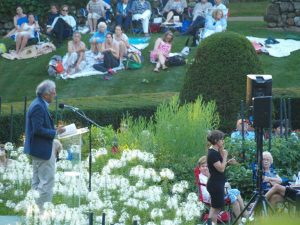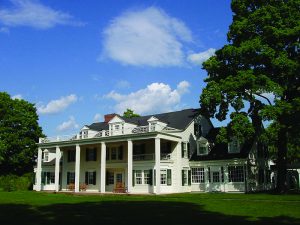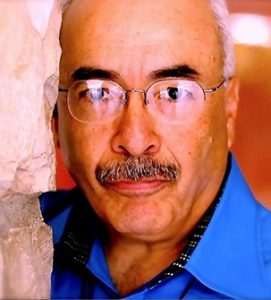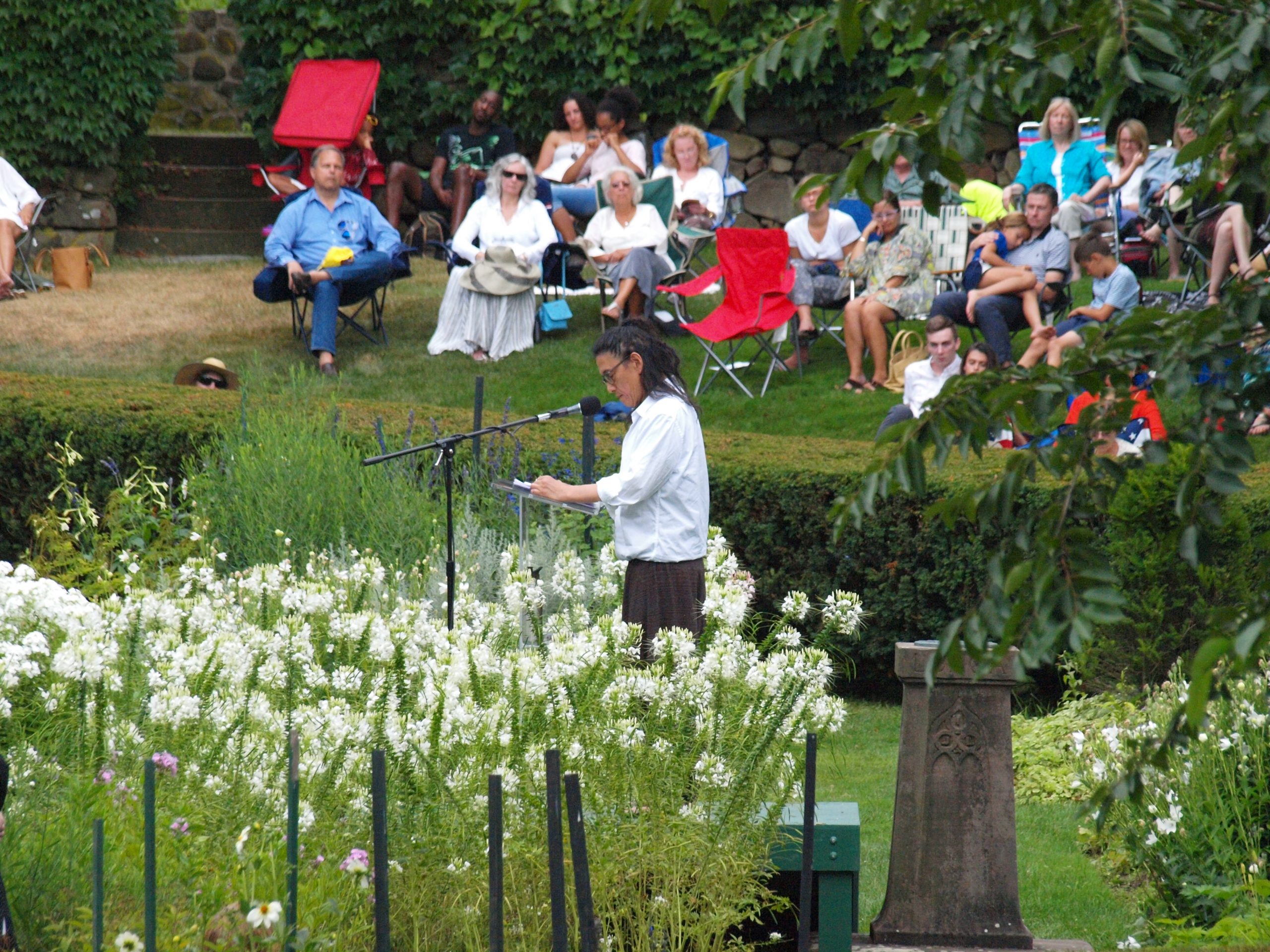Last spring, The Washington Post declared that “poetry is going extinct,” citing a recent report by the Census Bureau that showed a marked decline in poetry readership. But to the thousands who flock to the Sunken Garden Poetry Festival, hosted annually in the legendary Beatrix Farrand-designed garden at the Hill-Stead Museum in Farmington, reports of poetry’s death would seem, in the immortal words of Mark Twain, to be greatly exaggerated. Here, poetry lovers come from around Connecticut and beyond to hear the rock stars of the poetry world read their verse under the stars – amid the fragrant, floral tapestry of white, pink, purple and blue blooms in the Hill-Stead’s historic gardens.
“Poetry is the least appreciated of all the arts in terms of numbers, but here’s this place that celebrates it, encourages it,” says Litchfield poet Cheryl Della Pelle, who has attended the festival faithfully since its inception 24 years ago. “It’s an amazing thing to have this poetry festival right in our backyard. It adds so much to the community and to Connecticut – culture and intelligence and soul and beauty. It’s like a beautiful outdoor poetry gallery.”
To usher in the Hill-Stead’s annual celebration of the art of poetry, Seasons spoke to poets, English professors, literary publishers and other avid readers of verse about why poetry matters.

Poetry increases empathy, highlights life’s joys
Local champions of poetry insist that despite national statistics revealing a waning interest in the genre, poetry remains as relevant as ever.
“The language of any era’s poetry is always being reinvented, so there is always a sense of newness to poetry,” says V. Penelope Pelizzon, an associate professor of English at University of Connecticut and author of two collections of poetry. “I think that poetry is always exciting because it is the most intense use of language – and in some ways, language is the utmost thing that humans can do.” Beyond its literary merits, writers say, poetry serves to remind readers of the beauty and grace that still exists in an increasingly scary and sometimes ugly world.
“I think it matters even more in these days of international atrocities, because it offers a way of surviving in a world that is beset by dangers and crises,” says Rennie McQuilkin, Connecticut’s poet laureate and co-founder of the Hill-Stead’s poetry festival. “It offers that because it suggests the joys of life that can be forgotten in the midst of terrors. And it offers a defense against those terrors both in its reproach to those who would destroy civilization, and in its praise of that civilization and its values.”
Perhaps of equal importance is the fact that reading poetry increases our compassion for others. “When we read poetry from different places, different times and different people, it helps us empathize with the way that people are – and it helps us to understand and humanize them more deeply,” says poet Edward Hirsch, who will be among the speakers at this summer’s festival. “Given globalization, now it seems to me more crucial than ever that we understand the way other people think and feel.”
Poetry also puts people in touch with their own thoughts and emotions, poets say, and imparts important life lessons. “Poetry teaches you that every word matters,” says Della Pelle, who leads poetry workshops at the Sarah Noble Intermediate School in New Milford. “And poetry connects people to their deeper selves. I don’t think that our culture encourages that kind of depth – not with the way we communicate through social media. Poetry gives you the time and the silence to think a thought all the way through.” Indeed, Shannon Hearn, a senior English and journalism major at UConn and editor of the Long River Review, the university’s literary journal, says that writing poetry has been “a way for me to find my own voice.” Hearn, who hopes to teach – as well as write – poetry in the future, adds that poetry can also be an important mode of expression for kids and teens.

Poetry as performance
Though the National Endowment of the Art’s latest Survey on the Public Participation in the Arts shows that fewer Americans read poetry than ever before, historically, poetry was actually one of the more popular arts. “Poetry was a vital force in people’s lives in this country in the 19th century and even in the early 20th century,” notes McQuilkin. “Henry Wadsworth Longfellow, an American poet, was the best-selling author of his day – and every soldier fighting abroad during World War II was given a copy of Robert Frost’s poetry.”
Now, though there are “wonderfully creative pockets of poetry,” especially in Connecticut, McQuilkin says, “we’re not a particularly poetic people as a nation.” Hirsch adds that while in other cultures, poetry has been passed down through families and through tribes, here in the U.S., that tradition has been lost, so the burden of preserving poetry has fallen on schools. “Given the current culture,” he says, “teachers have been under so much pressure that poetry often falls through the cracks—or is taught badly. I wrote a book called How to Read A Poem and Fall in Love with Poetry, and the fact that the book has reached such a wide audience tells me that there are many people who have felt that there is something in poetry for them but it’s been mystified. Once you demystify it, people often respond to the information it carries.”
Poets and teachers agree that listening to poems can often make them more accessible. “Poets share a part of themselves in sharing their voice out loud – you hear something that maybe you wouldn’t hear on the page,” explains Darcie Dennigan, a poet and assistant professor in residence at UConn. “You can listen to poems as you’d listen to music – you can appreciate them on an intuitive and visceral level.”
Glastonbury resident David Mayhew, who helps coordinate the largest poetry event in North America – the Geraldine R. Dodge Poetry Festival in New Jersey – confesses that until he went to his first poetry festival, he viewed poetry as something that he was “forced to endure” in school. The poets he was exposed to, he recalls, “were for the most part dead white men and Emily Dickinson,” and he said his poetry education was all about memorization and had nothing to do with simply enjoying the poems. “Then I encountered living, breathing poets, reading their own work and somehow bringing them to life,” he said. “To this day I can’t read poetry on the printed page – it just doesn’t work for me. But when I hear that same poet read it aloud, somehow it’s accessible.”
Indeed, McQuilkin believes that one of the reasons many people don’t appreciate poetry is because they haven’t listened to it. Just as you have to attend Shakespeare’s plays to really appreciate them, he says, poems become more approachable when read out loud. Many of the early poets, in fact, were minstrels or troubadours who went from place to place singing their poetry to the accompaniment of a lyre, McQuilkin points out. “The impetus behind starting the Sunken Garden Poetry Festival,” he says, “was to make poetry, once again, a performance art.”

A cultural phenomenon
McQuilkin was teaching English at Miss Porters in the early 1990s, he says, when Sara Lytle, director of the Hill-Stead at the time, invited him to look at the Sunken Garden to “see if it was a place where poetry might flourish.” Still, when 800 people showed up at the fledgling festival’s first reading, “everyone’s mouth dropped,” McQuilkin says. “If five people showed up for a reading, that was considered good. It was a sign that this was meant to be.”
Since that first reading, in 1992, the Sunken Garden Poetry Festival has attracted more than 65,000 patrons, and has hosted several poets laureate, including Ted Kooser, Natasha Trethewey, and Billy Collins, who called the festival “a cultural phenomenon.” Pulitzer Prize-winning poet Vijay Seshadri read at last summer’s festival. “It’s amazing you can get this many people gathered together to listen to poetry,” he told organizers.
The festival, which has been referred to as “the Tanglewood of poetry,” features both poetry and music; guests are invited to bring picnics, blankets and lawn chairs, just like at the famed concert venue in the Berkshires. Each event features readings by two poets, and a musical interlude, and the headlining poet also offers a writing workshop, which, according to Lisa Lappe, program manager of the festival, typically “sells out in minutes.” Early arrivals can participate in a Q-and-A with the headlining poet that takes place in the Makeshift Theater adjacent to the Hill-Stead’s Carriage Barn. “You sit outside and the garden is gorgeous, and it’s this whole experience and this whole vibe – we are all just going to sit here and exist and listen to poetry,” says Hearn, who interned at the festival last summer. “It’s a beautiful and special thing they have going on here.”
Part of what makes the experience so magical, suggests national poet laureate Juan Felipe Herrera, who will be featured at the Sunken Garden on August 7, is that “poetry loves the open air.” He says that “poetry is not meant to be locked up,” and that even though poets write poems in small places, poetry is really made for open-air gatherings, which is where poetry began. “Lots of people become aware of poetry in this kind of environment,” he notes. “We’re going to have a good time.”
Herrera will be part of a weekend dedicated to Latino poetry; another weekend will be devoted to poetry – as well as music and artwork – by war veterans, including headlining poet Brian Turner, who will read on July 10. Edward Hirsch, Heather McHugh and Kwame Dawes will also share their poetry. “We just want to continue to connect people from all over the state and surrounding states to the art of the spoken word,” says Lappe of the festival’s mission, “and to connect culturally-specific poetry to the general poetry audience.”
The Sunken Garden and other such festivals not only bring poetry to the masses, poets say, but allow people who find it difficult to read poems to enjoy poetry rather than struggle with it. “We live in a performance culture – we like to be entertained,” says Pelizzon, who describes the Sunken Garden venue as “almost distractingly beautiful” – and one of the nicer venues she’s read at. She suggests that attending a poetry festival can be almost like a “gateway drug” to poetry. “Whatever it takes to get people excited, I think, is a good thing.”
If poetry is, indeed, at risk of extinction, perhaps the Sunken Garden Poetry Festival – and other such events – can be seen as a sanctuary, for an art form that dates back to pre-history. “Festivals like this are important because they celebrate something that is at risk in the culture,” says Hirsch. “We are under a kind of siege now because we live in a mass culture with a kind of constant sense of distraction – poetry asks us to slow down and pay attention.”
For tickets to the Sunken Garden Poetry Festival, go to www.hillstead.org and click the festival link.
Lori Miller Kase is a freelance writer living in Simsbury.






More Stories
A New, Free Peabody Museum Prepares for Opening
Arts & Entertainment – Autumn ’23
Richard Thomas: Acting Is His Life